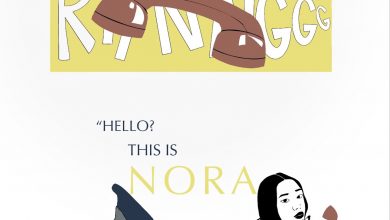Feminist Year in Review: Top Albums, Part 2
 A Feminist in Love: An Ode to Adele’s “21”
A Feminist in Love: An Ode to Adele’s “21”
The year 2011 was especially remarkable because Adele released her heartbreaking album “21.” I’ve been a fan of the British chanteuse since her debut album “19,” and I am so thrilled that she is finally getting the recognition she deserves in the United States. Adele has successfully climbed the billboards, was dubbed artist of the year by iTunes and her song “Rolling in the Deep” was the most downloaded song in 2011. Thus, Adele was a regular staple of popular radio stations, a ubiquitous figure of music award shows, and her presence repeatedly graces early morning music videos. Adele was consequently a hard figure to ignore in 2011. I wholeheartedly concur with iTunes’ statement that Adele truly was the musical sensation of the year. All throughout 2011, I’ve sung along with Adele in my car while driving to school and work, listened to her while studying, and most importantly, she helped me get through my own heartbreak. Indeed, Adele’s heart-wrenching albums are typically about love, relationships, and the men she is in love with. Adele’s album “21” is the ultimate break-up album and her pining ballads appear to be the polar opposite of Lady Gaga’s empowering “forget men and patriarchy” anthem “Scheibe.” In fact, whenever I claim that Adele is a feminist, I always receive either quizzical sidelong glances, incredulous stares or angry proclamations that Adele is “dependent on love and men.”
Adele’s songs are indubitably inspired by experiences of love and relationships. However, being vulnerable, being in love, or wanting romance should not deprive a woman of her status as a strong female or feminist. I nominate Adele as the musical feminist of 2011 because she artfully balances female vulnerability and strength. Adele demonstrates that it is perfectly acceptable to have emotions or reveal a hidden vulnerability. Moreover, she shows that a woman does not have to denounce independence or strength if she ever falls in love or is hurt. Many of my feminist friends adopt an impenetrable and impervious attitude towards love and potential suitors. Although I sometimes envy their formidable strength and would love to emulate them, I believe Adele also presents an alternative, but nevertheless laudable, feminist portrait. Adele humanizes feminism and manifests that everyone gets hurt. More importantly, Adele does not fall to her knees, defeated, when her heart is broken. Instead, she rises and turns her sorrow into art. She handles a broken heart with elegance, maturity, and strength.
My favorite song on the “21” album is “Someone Like You.” Yes, the song may be overplayed on the radio, can appear to be trite and maudlin, and has even been parodied on Saturday Night Live. However, the song displays Adele’s strength in love. The song tells the story of a lost opportunity in love that many of us often experience. After breaking up with a beloved, the subject of the song finds her former flame married while she is still alone. As a result, the song also divulges fears of spinsterhood or being alone. Adele explained the song’s inspiration in an interview with DigitalSpy magazine by stating “I can imagine being about 40 and looking for him again, only to turn up and find that he’s settled with a beautiful wife and beautiful kids and he’s completely happy… and I’m still on my own. The song’s about that and I’m scared at the thought of that.”
Doesn’t sound very feminist, right? Nonetheless, I believe the song shows Adele’s maturity. Although disappointed in a lost love, the speaker of the song wishes her ex-lover well and hopes he will have happiness in his live. She is not resentful, bitter, or angry. She does not go home and sob in a bucket of ice cream. Instead, she is resolved to find someone else to fall in love with and search for happiness. This resolution simultaneously reveals the vulnerability and strength within everyone. I love “Someone Like You” because the speaker of the song does not victimize herself, but moves on with her life. She also accepts that heartbreak and disappointment are inevitable aspects of the human condition.
Another song that I absolutely love on “21” is “I Found a Boy.” This gorgeous ballad describes a woman’s efforts to resist an ex’s attempts to reenter her life. The speaker of the song successfully shields herself from a flood of beloved memories and does not run into the arms of her estranged lover whom she believes to be wrong for her and has questionable intentions. She preserves her self-respect and dignity and stays with a more deserving man.
“But I found a boy who I love more,
Than I ever did you before,
So stand beside the river I cried,
And let yourself down!”
The speaker clearly recognizes that she is worth more than having her heart broken again. Again, Adele’s vocals and lyrics both manifest her strength and self-possession. By refusing to be a victim or naïve ingenue, Adele’s resolve in resisting the “wrong man” despite her love for him in her pursuit of happiness is clearly a feminist message. Indeed, she triumphs over her seducer and reigns victorious in the lines “Look how you want me now that I don’t need you!” and “I won’t stand by you!”
“I ain’t yours for no taking You must be mistaken I could never look in your eyes And settle for wrong And ignore the right”In addition to her inspiring words, Adele also demonstrates that she does not have to show skin, wear sexy outfits, or be a size 0 to be appreciated for her talent. Although Adele is a stunningly gorgeous young woman, she does not exploit her physical appearance or succumb to popular culture’s obsession with sex to sell records. She is a powerhouse of emotion and talent and relies on mere minimalism to express her art. I applaud Adele’s resistance to both the sexual objectification of pop stars and pressures of being thin. Adele is a feminist role model simply for espousing self-acceptance and a positive self-image. The Grammy award-winning star told Vogue in October, “I enjoy being me; I always have done. I’ve seen people where it rules their lives, you know, who want to be thinner or have bigger boobs, and how it wears them down. And I just don’t want that in my life.”
Adele’s alluring self-confidence, fearless representation of vulnerability and heartbreak, and portrayal of a mature, strong woman in love render her to be the perfect feminist musician of 2011.









One Comment